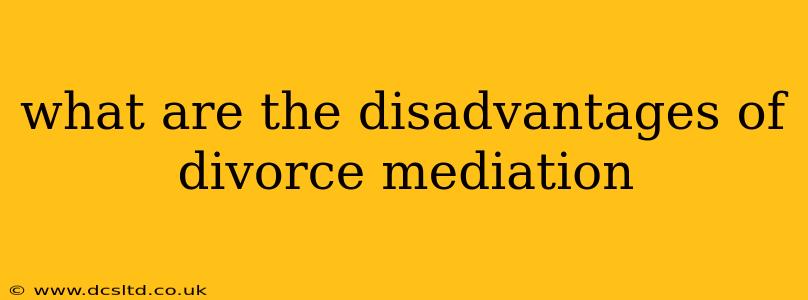The Disadvantages of Divorce Mediation: A Balanced Perspective
Divorce mediation, while often touted as a less adversarial alternative to traditional litigation, isn't without its drawbacks. Understanding these potential disadvantages is crucial before choosing this path. This article will explore the downsides of divorce mediation, addressing common concerns and offering a balanced perspective.
1. Power Imbalances Can Be Exacerbated:
One significant disadvantage is that mediation can inadvertently exacerbate existing power imbalances between spouses. If one partner is significantly more assertive, knowledgeable about legal matters, or financially stronger, they might dominate the process, potentially leading to an unfair settlement. This is particularly true if one party lacks access to independent legal counsel or support.
2. Lack of Legal Representation:
While some mediators encourage or require each party to have their own attorney, it's not always mandatory. This lack of individual legal representation can leave participants vulnerable to making agreements that are not in their best interests. A lawyer can provide crucial insights into the legal ramifications of specific decisions and identify potential pitfalls.
3. Inappropriate for High-Conflict Cases:
Mediation thrives on cooperation and a willingness to compromise. For highly contentious divorces marked by significant animosity, abuse (physical, emotional, or financial), or a history of violence, mediation might not be the best approach. In such situations, the structured environment of the courtroom with a judge's oversight may offer better protection.
4. Mediator Bias (or Perceived Bias):
Although mediators are trained to remain neutral, the perception of bias can arise. If one party feels the mediator favors their spouse, the process can break down, leading to wasted time and resources. Transparency and clear communication from the mediator are key to mitigating this risk.
5. Limited Enforcement Options:
Mediation agreements are generally less easily enforced than court orders. While a mediated settlement agreement has legal weight, enforcing it can be more challenging and costly if one party fails to comply. This lack of enforcement power is a key consideration.
6. Time Commitment Can Be Lengthy:
While mediation is often faster than litigation, it’s not a quick fix. It requires multiple sessions, preparation of financial documents, and a significant time commitment from both parties. If one party is uncooperative or delays the process, it can extend the overall timeline unexpectedly.
7. Not Suitable for Complex Financial Situations:
Mediation may not be ideal for divorces involving intricate financial arrangements, such as significant assets, businesses, or trusts. The complexity of these issues often necessitates the expertise of financial professionals and legal counsel, which are more easily incorporated within the court system.
8. Emotional Toll Can Be Significant:
Negotiating sensitive matters such as child custody and asset division during a highly emotional time can be taxing. Even in successful mediation, the process can be emotionally draining for all involved, potentially delaying healing and recovery.
Conclusion:
Divorce mediation offers numerous advantages, but it's crucial to understand its potential drawbacks. A careful assessment of your specific circumstances, the level of conflict, and the complexity of the divorce is essential to determine if mediation is the right approach for you. Consulting with a legal professional can provide valuable guidance in making this crucial decision.
